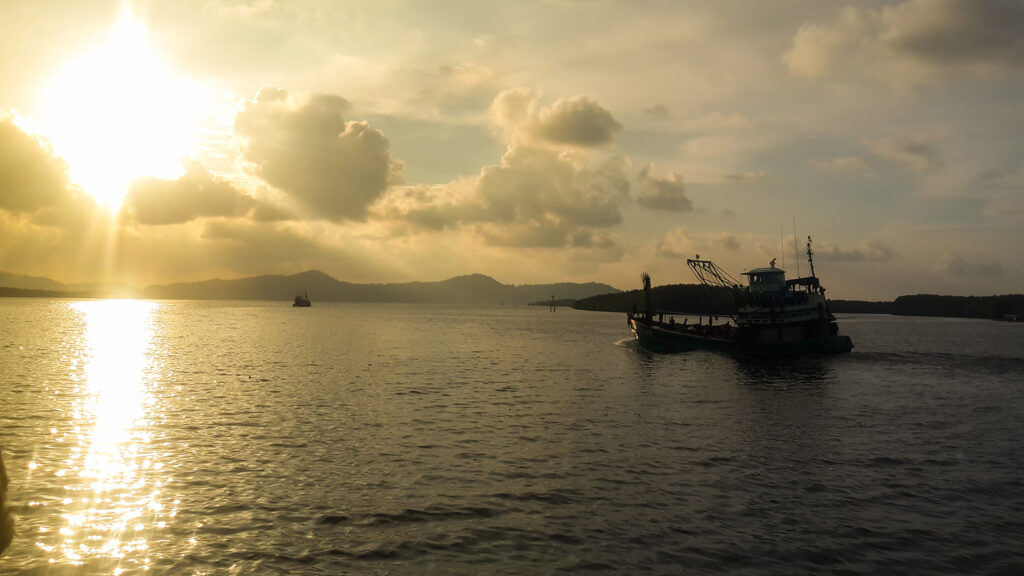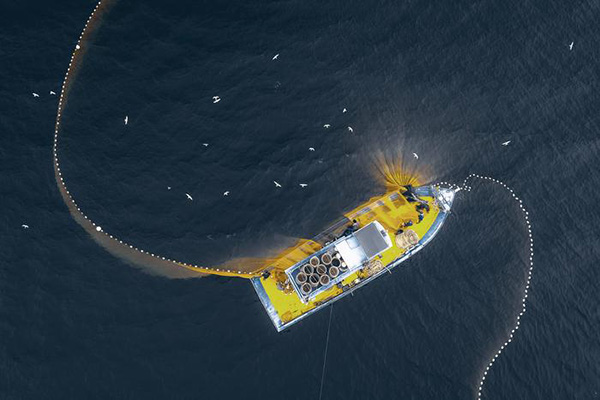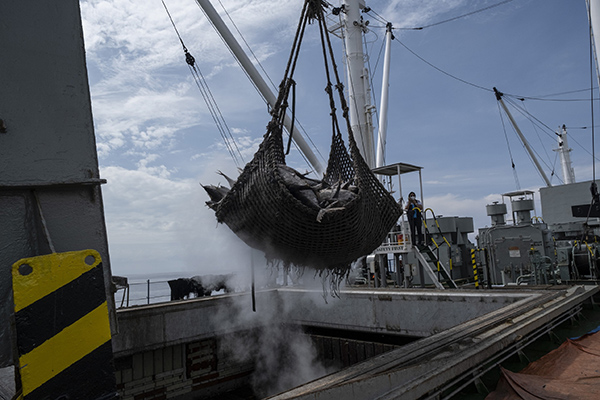Commercial fishing is a $141 billion business but tracing the profits is complex work for enforcement authorities

A recent Issue Brief from The Pew Charitable Trusts (October 17, 2023) argued for greater transparency and accountability in the global fishing industry, highlighting the difficulties of identifying ownership of fishing vessels.
The commercial fishing industry, Pew wrote, brings in $141 billion a year, but tracing where and with whom the profits end up is nearly impossible because of what it says are obscure corporate structures used by many large-scale fishing companies. At the end of these elaborate ownership chains is the “ultimate beneficial owner” (UBO), or the individual or individuals who gain the most from a vessel’s operations.
“Complex ownership chains involving multiple companies and nationalities can make the work of determining who benefits from a vessel’s activity – and who should be held accountable if those activities violate national or international law – much harder, if not impossible, for government authorities. Far too often, ultimate beneficial owners, UBOs, go without punishment while those on the water face harsh sanctions,” according to Pew fisheries experts, led by Peter Horn, the NGO’s international fisheries project director.
But the UBO is not always a vessel’s registered owner and can be difficult to identify because international rules do not ensure full transparency, the brief concluded. This is especially true for vessels that fish in areas beyond the national jurisdiction of their home country, which Pew stated is increasingly the case as growing pressure on fish stocks drives many fishing vessels, from companies large and small, farther out to sea into waters beyond national jurisdiction to bring in catch and profits.
What is ultimate beneficial ownership?
At the start of any vessel ownership chain, including those for fishing vessels, is the registered owner. Generally, the registered owner – typically a person or business – is the only owner named on licensing applications and vessel registration forms. Additionally, the registered owner’s name is the only ownership information that fisheries authorities request that is publicly available or that is shown on commercial tracking platforms, such as IHSMarkit or MarineTraffic.
However, for many industrial-sized fishing vessels, the registered owner is not the person or entity who profits most from the vessel’s activities. Instead, a single vessel often has many layers of owners – shell companies, corporate vehicles and joint ventures – who may be located in the same country or spread throughout the world. And at the top of the list sits the UBO, but no international consensus exists regarding precisely who or what qualifies as a UBO.
In addition, fishing is held to a lower standard than other extractive industries, according to Pew. Many fishing states do not request beneficial ownership information when a fishing vessel is registered to their flag or when issuing a license to fish in their Exclusive Economic Zones (EEZs), so governments struggle to determine where profits from the vessel’s activities will ultimately be realized. This in turn limits countries’ ability to track the money, tax the profits and meet other key oversight and governance responsibilities.
Moreover, overfishing and illegal, unreported and unregulated (IUU) fishing are major threats to the health of global fisheries, according to the report. IUU fishing costs the global economy up to U.S. $36.4 billion annually, but often illegal behaviors are disguised by similarly complex corporate and ownership schemes.
Oversight in these far high-seas areas is often unreliable, making them ripe for IUU fishing. And much of this unauthorized activity is carried out, systematically, on an industrial scale, with the profits going to owners of large corporations. But because ownership is often complicated and regulatory structures are weak, on-the-water fishers are often the only people held accountable for IUU fishing, while those who orchestrate, organize and profit from it escape sanctions and fines.
With ocean health and global fisheries straining under increasing pressure, including from overfishing and the effects of climate change, ensuring that all fishing activity operates sustainably, in a transparent manner and with effective oversight – and that illegal operators are held accountable – is more important than ever. And to do that, fishing states, regional fisheries management organizations (RFMOs) and other stakeholders must act to clarify the true ownership of vessels and establish an internationally agreed upon definition of ultimate beneficial ownership, strong company data collection mechanisms and appropriate penalties for those who benefit most from IUU fishing.
According to Pew, fishing states can improve fishing vessel oversight by:
- Establishing a global definition of ultimate beneficial owner. The FATF (Financial Action Task Force; an intergovernmental watchdog group that sets standards for nations and financial institutions on countering money laundering and the financing of terrorism) definition of ultimate beneficial owner is already used by many international financial and law enforcement communities and is a starting point for worldwide transforming vessel ownership tracking. Global adoption of this definition would also align the interests of fisheries and treasury and justice ministries, which would make information-sharing easier.
- Collecting UBO information for all fishing vessels. All states with a fishing industry, regardless of size, should collect UBO information when they register, flag or license a fishing vessel. States should also have a beneficial ownership registry and make the information free and public on a national website.
- Enforcing domestic penalties for citizens engaging in or profiting from IUU fishing, no matter where it occurs. All countries should enact laws that prohibit their citizens from benefiting from IUU fishing activity in any other country’s waters or on the high seas and authorize appropriate sanctions, and some States already have such legislation.
“Purposely creating an intricate ownership structure for a fishing vessel or company is not illegal, but it can enable IUU fishing and hinder enforcement, and makes UBO a complex issue. Countries need to urgently re-evaluate how they regulate fishing vessels and vessel ownership chains so they can implement and maintain better governance of their fleets and protect fisheries resources,” Pew concluded.
Now that you've reached the end of the article ...
… please consider supporting GSA’s mission to advance responsible seafood practices through education, advocacy and third-party assurances. The Advocate aims to document the evolution of responsible seafood practices and share the expansive knowledge of our vast network of contributors.
By becoming a Global Seafood Alliance member, you’re ensuring that all of the pre-competitive work we do through member benefits, resources and events can continue. Individual membership costs just $50 a year.
Not a GSA member? Join us.
Author
-

Darryl Jory, Ph.D.
Editor Emeritus
[103,114,111,46,100,111,111,102,97,101,115,108,97,98,111,108,103,64,121,114,111,106,46,108,121,114,114,97,100]
Tagged With
Related Posts

Fisheries
WTO members agree to curb subsidies that contribute to overfishing
World Trade Organization members have struck an agreement to end subsidies that contribute to overfishing, a decision that took 20 years to reach.

Fisheries
Can a data-sharing tool eliminate IUU fishing and make seafood supply chains more reliable?
The Sustainable Fisheries Partnership’s new data-sharing tool helps users identify environmental risks and eliminate IUU fishing in seafood supply chains.

Fisheries
Can an underwater artificial intelligence bot detect IUU fishing?
A new underwater artificial intelligence bot could "revolutionize" ocean monitoring and IUU fishing identification, scientists say.

Fisheries
Endorsement of transshipment guidelines marks a key move against IUU fishing
To curb IUU fishing, an intergovernmental forum on fisheries and aquaculture has endorsed new voluntary transshipment guidelines.


